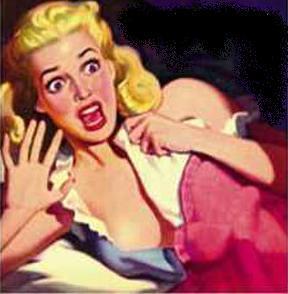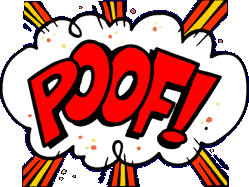Motivation, Motivation, Motivation!
 While I'm blessed to not have to do a lot of revisions, the most frequent one I'm asked to make is to flesh out my character's motivation. As the author, I know my characters intimately and because of this - sometimes I forget to clue the reader in on what they are thinking, or the most important of elements: why they do the things they do.
While I'm blessed to not have to do a lot of revisions, the most frequent one I'm asked to make is to flesh out my character's motivation. As the author, I know my characters intimately and because of this - sometimes I forget to clue the reader in on what they are thinking, or the most important of elements: why they do the things they do.When you think of a character as TSTL (too stupid to live) or hugely unsympathetic, it's almost always because the author hasn't shown you sufficient or acceptable-to-you motivation for their actions. Why did the girl go into the basement when she suspected the ax wielding psychopath was down there? Too often the why is so spurious, the girl is pronounced TSTL. But what if she weren't? What if she were a former Marine carrying a weapon? Or a mother who believed she could convince her son to stop?
I've been a teenager...so have you. I've raised a few of my own as well and I can say honestly, I've never known any as stupid as the ones that seem to populate horror movies.
Otherwise intelligent characters can come off looking criminally stupid when their actions aren't properly motivated. So, what are some of the common "motivation mistakes" we see in writing?
 The character who acts based on the simple misunderstanding. We've all heard of this one, yes? We're told that the "big misunderstanding" is a rotten reason for conflict in a book. Our teachers and mentors are oh, so right. A misunderstanding that would easily be remedied by discussion with someone else (doesn't even have to be the other protagonist) won't motivate behavior that is otherwise unbelievable.
The character who acts based on the simple misunderstanding. We've all heard of this one, yes? We're told that the "big misunderstanding" is a rotten reason for conflict in a book. Our teachers and mentors are oh, so right. A misunderstanding that would easily be remedied by discussion with someone else (doesn't even have to be the other protagonist) won't motivate behavior that is otherwise unbelievable.Nothing is more annoying than slogging through pages of conflict between two otherwise likable people simply because one of them has the wrong end of the stick and refuses to grasp hold of the right one.
The hero or heroine whose actions are driven by faulty and unreasonable assumptions. Assumptions that make no sense to your readers will not float your story...not even in the name of humor. Your readers need to be rooting for your characters and their happy endings, and that's not as likely when they consider your hero or heroine too ridiculous for words.
Properly motivated spurious assumptions can make for really good reading though. Think about the heroine who thinks he would never be interested in her when in reality he fancies her something rotten. If she believes this because she's been rejected by boys all her life as being too boring or because he has a well known type and she'd antithetical to it, well that can work, yes? But if she simply believes it to move the story forward another 20 pages, readers are going to know that and get mightily irritated.

The character who pops up out of nowhere and disappears the same way when they've played the prop they need to your plot. If you have a villain, or a well-meaning matchmaker pushing your characters together, please take the time to figure out the how and why and explain that to your readers.Something to remember when its relevant to the type of story you are writing: your protagonist is only as strong as the villain they're facing and if that villain isn't motivated or fleshed out, the protagonist comes off looking weak and ineffectual - even when they win.
The character that is unsympathetic. This character is often motivated by things that readers by and large find less than heroic or understandable. My super alpha heroes are often unlikable in the beginning of a book, but I plant the seeds for their redemption as early as the first page, if I can. This is also where my editors often ask me to go back and reveal more of his reasons for doing what he does to the reader.Someone suggested I watch "Doc Martin" (a British medical show that I think is supposed to be funny), so I did. I find pretty much all of the characters incomprehensible and somewhat unlikable. The final episode I watched (I gave it more than one chance) that absolutely turned me off the show had the local school teacher who was interviewing for the position of head mistress treat a child whose mother was in hospital like a total bother. Since children and their welfare is a hot button for me, that was the final straw for me. I've no interest in watching another episode.
When this happens in a book, I'll end up adding an author to my "Do Not Buy No Matter How Intriguing the Story Sounds" list. I know I've had a character, or two, hit a reader in the same place. One of my heroes, I realized I could have done a better job of revealing his inner workings throughout the book and his transformation at the end...another, I stood by.
The woman who thought I would love "Doc Martin" really enjoyed the show herself and was hugely disappointed when it got cancelled after 5 seasons. So, we have to acknowledge that what is unlikable for one reader may well be adorable to another. This is where it becomes hugely important to understand your market and the heroic archetypes that work (and conversely don't work) for your readers or potential readers. It's not enough to say, "Well...she's just not my reader," when her viewpoint is reflected in the vast majority of your target market.
The character whose behavior is obviously driven by plot or word count. I'll admit these books are my least favorite and most likely to get an author on my "Do Not Buy" list. But we've all read them, haven't we? The story that could have been over on page 50 but drug on to 397 because the characters just kept doing things that made no sense so the story could be longer. Even worse is the character who plainly doesn't fit the plot. The author is intent on writing a certain story, but she chose the wrong characters to tell it with and this is apparent in Chapter One and never, ever gets better.
In short, when writing the complex or the simple, one thing remains paramount: motivation!
It's your turn: what's your favorite new television show? Are the characters likable, or interesting enough to be unlikable and still watchable?
Published on October 31, 2011 12:00
No comments have been added yet.



